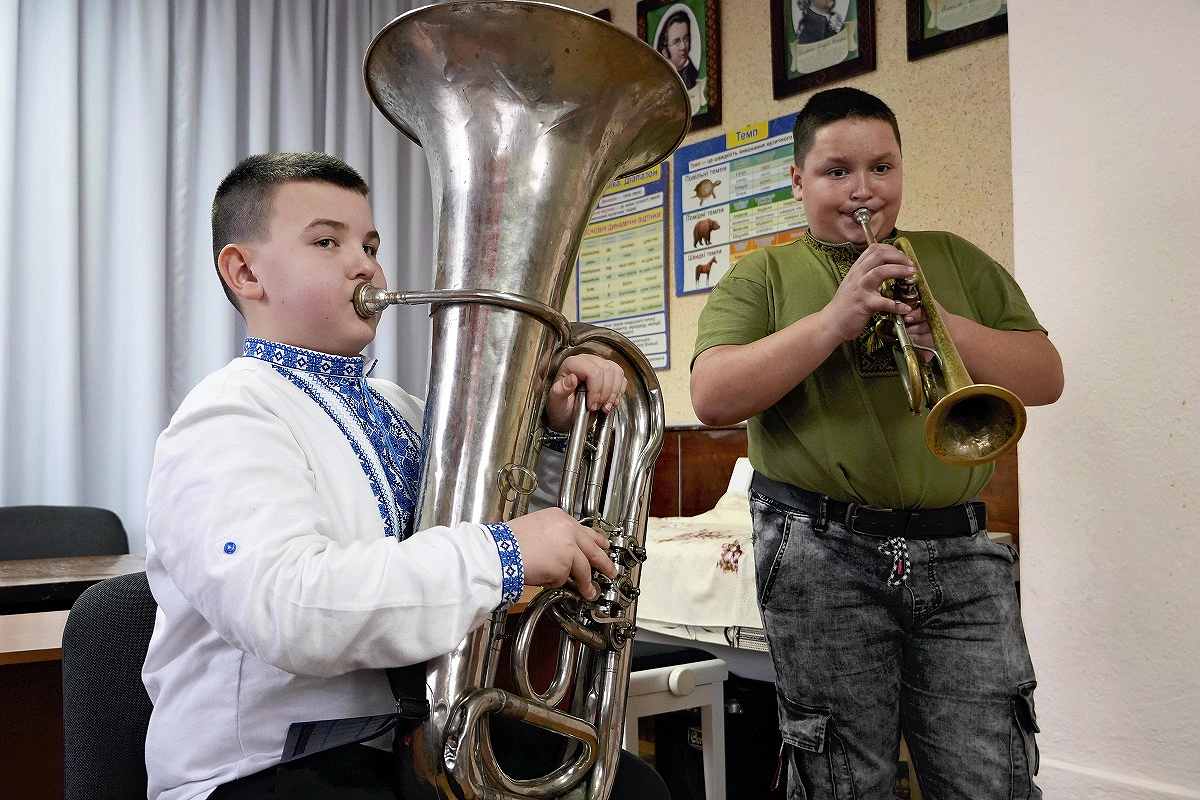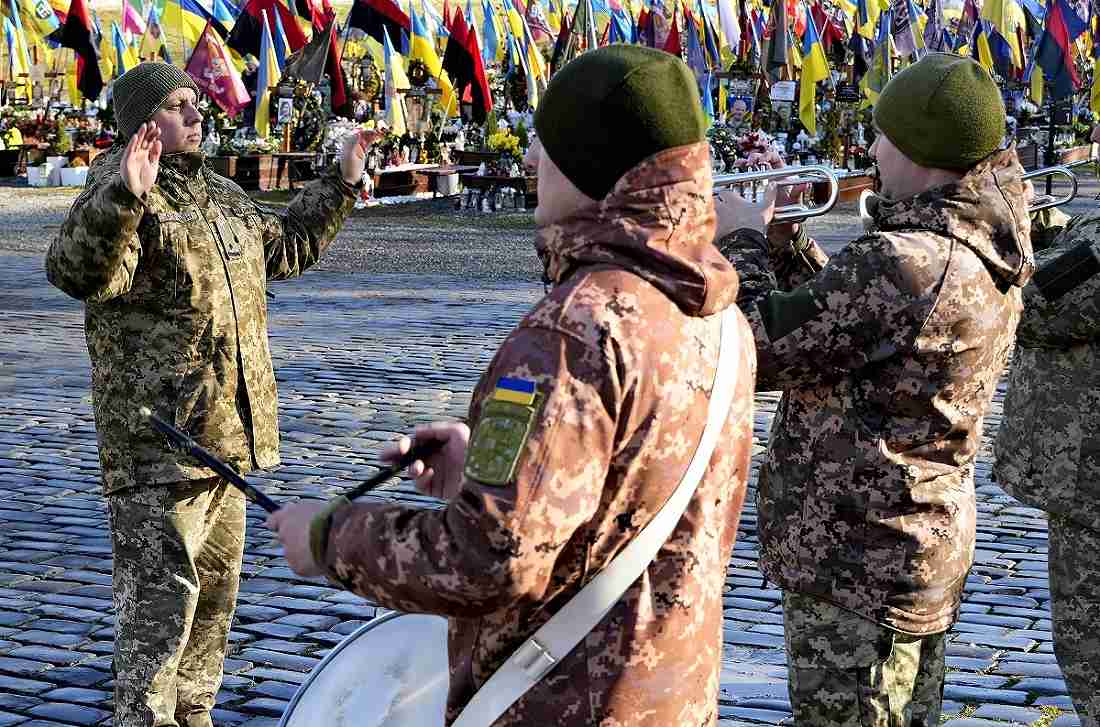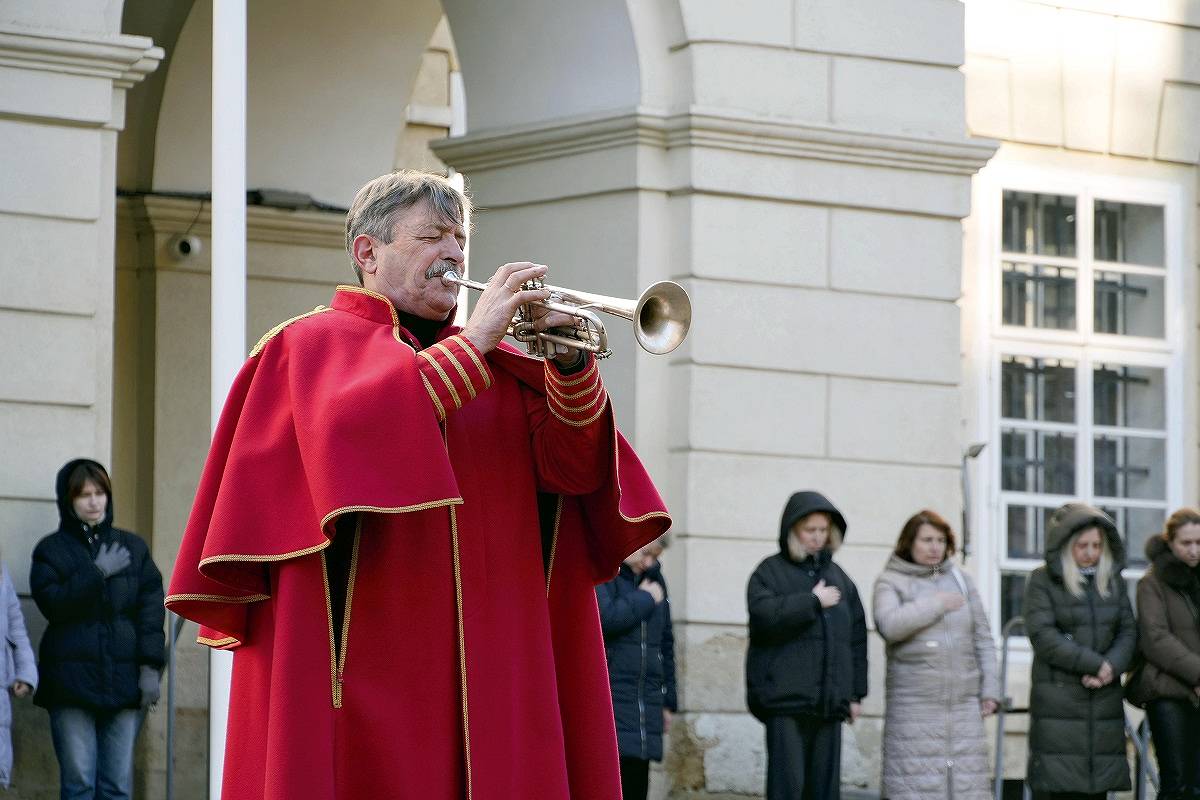3 Years Of Aggression Against Ukraine: Music of Mourning Resonates Across the Country; Funerals for the Fallen a Daily Occurrence

Denys Haponyuk, right, and Vladyslav Narok practice a music piece to be played at funerals for fallen soldiers in the village of Verba in the Rivne region of Ukraine on Jan. 31.
7:00 JST, March 2, 2025
KYIV — Three years since the start of Russia’s aggression against Ukraine, funerals have been taking place across the country every day as the bodies of soldiers killed in battle with Russian forces are returned home. To show respect for the fallen who lost their lives protecting their country, and to express condolences for their loved ones, there are people who play music as the dead are laid to rest.
At a music school in the village of Verba in the Rivne region of western Ukraine, two boys were practicing musical instruments with earnest expressions on their faces. The piece they were playing was a funeral march to be played while a coffin is moved.
Denys Haponyuk, a 13-year-old trumpeter, joined a funeral orchestra in the village a year and a half ago and has taken part in funerals for eight people so far.
He was a little scared at first, so he tried as much as possible to avoid looking at the coffins and the photos of the deceased. However, he came to learn that their bereaved family members had a strong desire to send their loved ones to heaven in an honorable manner. Thinking that the village and the country might have fallen apart if the soldiers had not protected them, Haponyuk was filled with a sense of responsibility.
The population of the village is around 3,000 people, so he knew most of the soldiers who died. Among the dead soldiers was the 21-year-old older brother of a friend with whom he had played soccer. If he got caught up in grief, he would not be able to play the trumpet well. For that reason, Haponyuk has always tried to focus only on showing his best performance.
The orchestra was recently joined by its youngest member, tuba player Vladyslav Narok, age 10. The boy lost his father, who was killed at age 42 on the front line of the war a year ago. He had not attended a funeral since his father’s. Narok was very nervous, wondering if the memories of that day would make him unable to play the tuba. However, his 36-year-old mother encouraged her son, telling him that the living should show respect for the dead. He deeply understood what she meant as they shared the same loss.
In late January, he performed at a funeral for the first time. Haponyuk encouraged him, saying, “Relax; it’s OK,” which enabled him to perform to the end. Many of those who attended the funeral praised his effort. After that, Narok felt like he had become a little stronger than before.
‘This war must be ended’
The sounds of music played by military band members dressed in camouflage fatigues to honor the dead resonate in a cemetery in Lviv, western Ukraine, every day.
Yuriy Melnyk, the band’s 44-year-old conductor, has already seen off countless dead soldiers.
Melnyk, who had worked as an orchestra conductor in Kyiv, volunteered for the military after Russia began its aggression in Ukraine. About a month later, he was appointed not to a battlefront but to the military band.

Yuriy Melnyk, left, conducts a military band at a funeral for a soldier killed in battle with Russian forces in Lviv, Ukraine, on Jan. 27.
He attended a funeral for one of his friends from music school. Not only was he sad, but he had the frightening thought that this funeral could have been for Melnyk himself if their positions had been the other way around.
The hardest part about a funeral for him is the moment when the national flag that had draped the coffin is folded and handed over to the bereaved family members before the coffin is buried. He has seen wives or mothers sobbing for their loved ones and very young children who do not even understand the deaths of their fathers. He tells other teary band members that they should do what they must.
“Young people, who are supposed to start families and shoulder the future of the country, keep dying. This war must be ended,” Melnyk said in a strained voice.
Delivering respect
A hearse led by a police car stops in front of the Lviv municipal government building at 11:30 a.m. almost every day. Yaroslav Simkiv, 66, clad in a traditional red coat, closes his eyes and breathes into a trumpet.
The piece he plays is “Il Silenzio” by Italian composer Nini Rosso. As Lviv government officials and citizens pray in silence with their hands on their chests, only the solemn sounds of the trumpet can be heard.

Yaroslav Simkiv plays the trumpet in front of a municipal government building for a hearse bearing the coffin of a fallen soldier to a cemetery in Lviv on Jan. 27.
Before Russia’s aggression, Simkiv played the trumpet to mark noon in front of the government building. Since June 2022, 100 days after the aggression started, he began playing “Il Silenzio.” He chose the piece because he wanted to deliver peaceful rest and express his respect to fallen soldiers who were brought home from the hardships of the battlefields.
In 1978, when Ukraine was part of the former Soviet Union, Simkiv joined a military orchestra in Lviv as a trumpeter. Subsequently, Soviet forces invaded Afghanistan. Many young people in Lviv were mobilized into the military and their dead bodies returned home. Simkiv played the Soviet Union’s national anthem at funerals for them.
More than 40 years later, he now performs before the coffins of young people who fought against Russian forces, which makes him sad and angry. Anger is hidden in the tranquil sounds of his trumpet as he thinks about how long Ukraine must continue being the victim of the war.
Top Articles in World
-

Israeli Ambassador to Japan Speaks about Japan’s Role in the Reconstruction of Gaza
-

Videos Plagiarized, Reposted with False Subtitles Claiming ‘Ryukyu Belongs to China’; Anti-China False Information Also Posted in Japan
-

Chinese Embassy in Japan Reiterates Call for Chinese People to Refrain from Traveling to Japan; Call Comes in Wake of ¥400 Mil. Robbery
-

Russia: Visa Required for Visiting Graves in Northern Territories, Lifting of Sanctions Also Necessary
-

China, India Tapping into Promising African Market; Beijing Announces Tariff Cuts, Both Countries Aim to Expand Exports
JN ACCESS RANKING
-

Producer Behind Pop Group XG Arrested for Cocaine Possession
-

Japan PM Takaichi’s Cabinet Resigns en Masse
-

Japan Institute to Use Domestic Commercial Optical Lattice Clock to Set Japan Standard Time
-

Man Infected with Measles Reportedly Dined at Restaurant in Tokyo Station
-

Israeli Ambassador to Japan Speaks about Japan’s Role in the Reconstruction of Gaza
























